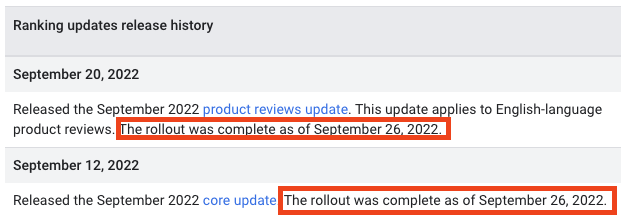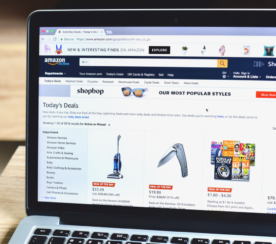

Google On How To Simplify Hreflang Implementation
source link: https://www.searchenginejournal.com/google-on-how-to-simplify-hreflang-implementation/466061/
Go to the source link to view the article. You can view the picture content, updated content and better typesetting reading experience. If the link is broken, please click the button below to view the snapshot at that time.

Google Core & Product Review Updates Finish Rolling Out
Google confirms the September 2022 core update and product review update are done rolling out.
Matt G. Southern
- 11 hours ago
- 2 min read
-
SHARES
-
READS

Google’s recent core algorithm update and product review update are done rolling out as of September 26, 2022, the company confirms.
Google quietly announced the rollout completion via its search ranking updates page.

Unlock (not provided) with Keyword Hero
See all your organic keywords in GA and their specific performance metrics. Free Trial. Cancel anytime. Professional support. 4-minute setup.
The September 2022 core update started rolling out two weeks ago, on September 12. The product review update launched a week later, on September 20.
Both updates finish rolling out on the same day, September 26, which is ideal if you eagerly await to assess their impact.
What To Do Next
Now it’s time to assess the impact of the updates by analyzing your website’s rankings and traffic patterns.
If you notice any significant and sustained changes, they’re likely the result of one or both updates.
How To Tell If You’re Impacted By The Core Update
Google applies core updates across all search results, and they have the potential to affect entire sites.
Google Search Advocate, John Mueller, explains how core updates target the whole site rather than specific elements:
“With the core updates we don’t focus so much on just individual issues, but rather the relevance of the website overall.
And that can include things like the usability, and the ads on a page, but it’s essentially the website overall.”
With that in mind, changes to search rankings across a majority of your website’s pages indicate the core update impacted you.
How To Tell If You’re Impacted By The Product Review Update
This one is more straightforward, as product review updates are only applied to search results for product reviews.
Do you publish product reviews? If not, then you weren’t impacted by the update.
If you do publish product reviews, pay careful to rankings. If you notice changes that are limited to product review pages, it’s likely because of the product review update.
On the other hand, ranking changes across your entire site are more likely the result of the core update.
Stay tuned for follow-up articles as we analyze the impact of these updates.
Source: Google
Featured Image: Pavel Ignatov/Shutterstock
Matt G. Southern
Senior News Writer at Search Engine Journal
Matt G. Southern, Senior News Writer, has been with Search Engine Journal since 2013. With a bachelor’s degree in communications, ...
Subscribe to SEJ
Get our daily newsletter from SEJ's Founder Loren Baker about the latest news in the industry!
Google On How To Simplify Hreflang Implementation
Google’s John Mueller explains a simplified approach to implementing hreflang tag attributes.
Matt G. Southern
- 19 hours ago
- 5 min read
-
SHARES
-
READS

Google’s Search Advocate John Mueller says hreflang implementation doesn’t have to be as complicated as people think.
Hreflang is one of the more confusing aspects of technical SEO and among the most important for international businesses and publishers.
In reply to a thread on Reddit, Mueller outlines a simplified approach for publishers to follow.
Hreflang: The Problem
Hreflang is a link attribute that informs Google of the language used on a page. With that information, Google can show the page version corresponding to the language a person is searching in.
Without the hreflang attribute, Google may serve pages in a language the searcher doesn’t speak or pages specific to a country the searcher doesn’t reside.
In the r/TechSEO forum on Reddit, a user is seeking advice regarding the use of hreflang for websites in multiple countries.
They ask if they can get by with a partial implementation of hreflang. For example, they are setting up hreflang for versions of the website in the same language, such as Germany and Switzerland.
The alternative is linking all versions of all pages with hreflang, which is a considerable amount of work.
Mueller says that’s the best solution, but not exactly practical:
“In an idea [sic] world, you’d link all versions of all pages with hreflang. It would be the clean approach, however, sometimes it’s just a ton of work, and maintaining it if the sites are run individually is … good luck with that.”
Although linking every page with hreflang is the ideal solution, Mueller says it doesn’t have to be so complicated.
Hreflang: The Solution
First, Mueller suggests figuring out what needs fixing.
Identify whether a problem exists with searchers landing on the wrong site version.
If that isn’t happening, you may not need to implement hreflang.
Mueller states:
“In practice, you can simplify the problem. Where do you actually see issues with regards to people coming to the wrong country / language site? That’s where you should minimally implement hreflang (and, of course, a JS country/language recognizer / popupper to catch any direct visits). Probably a lot of that will be limited to same-language / different-country situations, so Switzerland / Germany in German may be the right place to start. Nothing breaks if you set up hreflang for 2 versions and have 4 unrelated versions.
If you already have these sites running, I’d check your analytics setup for traffic from Search, and compare the country where they come from vs the country that they end up on (pick one country, filter for the traffic from search, and compare the domains they end up on). If you don’t find a big mismatch there, most likely you don’t need to do a lot (or anything) for hreflang. There is no bonus for hreflang, it’s only about showing the most-fitting page in search for users in a specific country / language.”
Next, look at which pages searchers are landing on. One of the most likely mistakes Google can make is serving the wrong version of a website’s homepage.
Since brand names aren’t localized, Google doesn’t always know which version of a homepage to serve if that’s all a user types into the search box.
If you find searchers are landing on the wrong homepage, but there are no issues with other pages, you can get by with a partial implementation of hreflang.
Mueller states:
“When checking, focus on the most likely mistakes first: same-language / different-country sites is one, but there’s also homepage traffic. Often times a brand name is not localized, so when people search for it, it’s unclear to search engines what the expectation is. If you find a lot of mismatches on the homepage but not elsewhere in the site, you can also just do hreflang across the homepages (that’s often easier than all pages in a site). Or you could do a combination, of course, all homepages + all German-language pages. Hreflang is on a per-page basis, so the beauty (and curse) is that you can pick & choose.”
Lastly, Mueller reiterates that it’s possible to save a lot of time with hreflang by checking to see if there’s a genuine problem.
Google may serve the correct versions of pages all on its own, in which case you don’t gain anything by adding hreflang.
“In any case, before you rush off and work on this for a year, double-check that it’s an actual problem first, and if so, check where the problem is. Maybe there are super-simple solutions (maybe you just need a country/language popup and don’t even need the rest?), and you can spend your time more wisely elsewhere.”
Think of hreflang as a tool to utilize when needed. You can prioritize other tasks if there’s no need for it.
Source: Reddit
Featured Image: patpitchaya/Shutterstock
Recommend
About Joyk
Aggregate valuable and interesting links.
Joyk means Joy of geeK



